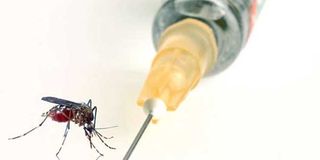Current tactics cannot win war on malaria, experts say

Experts now say the world may not win the war against malaria using current strategies. PHOTO | FILE | NATION MEDIA GROUP
What you need to know:
- The World Health Organisation targets to reduce the number of cases and deaths by 90 per cent by 2030.
- But even with the most optimistic projections, a team of scientists and public health specialists says the goal cannot be achieved as matters stand.
- In a report released on Friday, the experts say most tools being used to tackle malaria were developed in the last century or earlier.
Experts now say the world may not win the war against malaria using current strategies.
According to scientists, the fight has stalled and it requires massive investment and well as political leadership.
The World Health Organisation targets to reduce the number of cases and deaths by 90 per cent by 2030.
RAPID TESTS
But even with the most optimistic projections, a team of scientists and public health specialists says the goal cannot be achieved as matters stand.
In a report released on Friday, the experts say most tools being used to tackle malaria were developed in the last century or earlier.
These are insecticide-treated mosquito nets, indoor residual spraying, rapid diagnostic tests and drugs based on artemisinin.
“Promising new diagnostics, medication, insecticides and vector control approaches are being developed alongside passive immunisation such as monoclonal antibodies,” the report says.
“The world’s first malaria vaccine, RTS,S/AS01, has been deployed in Ghana and Malawi, with plans for rollout in Kenya.”
Kenya has since postponed the pilot test for the vaccine with the Ministry of Health saying a new date would be set.
The vaccine is expected to reduce mortality and morbidity of malaria, complementing existing interventions.
In the report titled "Malaria Eradication: Benefits, Future Scenarios and Feasibility", the scientists say new methods to fight the disease must be developed, adding that the campaign could cost billions of dollars.
“Global malaria infection and death rates have remained virtually unchanged since 2015. WHO’s 2018 World Malaria Report showed that the world is off-track in achieving the 2030 goals set out in the Global Technical Strategy for malaria including a 90 per cent reduction in the case incidence and mortality rate,” the report adds.
RENEWED AGENDA
Dr Marcel Tanner, the chairperson of the programme, said to achieve a malaria-free world, we must revive the drive to find the transformative strategies and tools that can be tailored to local situations.
“Business-as-usual is slowing progress and sending us backwards,” Dr Tanner said.
The team of experts advising WHO on malaria eradication said between 2000 and 2015, the number of cases declined by more than a fifth while deaths fell by half.
Since then, however, nothing much has changed.
“Freeing the world of malaria would be one of the greatest achievements in public health,” WHO Director-General Tedros Adhanom Ghebreyesus said.
“With new tools and approaches, we can make this vision a reality.”
According to an audit by Global Fund, Kenya has made gains in the war against malaria.
The country deployed about 14.9 million nets in its anti-malarial efforts in 2017 and 2018. Kenya achieved a 47 per cent reduction in malaria cases between 2015 and 2017.
WHO called for accelerated research and development in new prevention and treatment tools.
“One of the highest priorities is a renewed agenda that improves the knowledge base and products without which eradication will not be achieved,” the report says.





